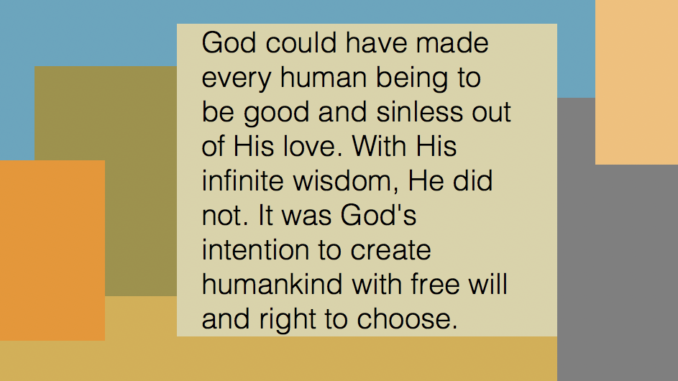
God is Eternally Just
Is it reasonable to believe that God sacrificed Jesus to show His love for humankind? A believer sees nothing unholy in God’s sacrifice of His son in favor and love of humans. The point which is often overlooked by this proposition is that God is not only eternally Just, He is also Almighty, the Possessor of infinite Mercy and Forgiveness. Indeed God is capable of forgiving any sin out of His Mercy. God is not in need of shedding blood of an innocent Jesus so that He can grant humans salvation and forgiveness. https://qpeace.net/?p=1004

Bible preaches individual accountability
By the same token, if a father kills his own innocent son to express his love and forgiveness for someone else’s sins, would the act of killing be considered as an expression of compassion or forgiveness? Rather, by all the ethical standards, the killing will be seen as an injustice and a gruesome way of expressing love. After all, if God wants to Forgive the sins of people out of His Love, it is within His Power to just forgive the sinner. It is interesting how Deuteronomy 24:16 looks at the sinner and the innocent in so very different way than the Christian church approaches salvation and sin.

Deuteronomy 24:16: “Fathers shall not be put to death because of their children, nor shall children be put to death because of their fathers. Each one shall be put to death for his own sin.” https://www.biblegateway.com/passage/?search=Deuteronomy+24&version=NIV

The Quranic theme: God is the most Kind and the most Forgiving
As can be seen in the Quran, God acknowledges Himself as the One who bestows infinite Mercy and forgiveness to His servants. God’s Mercy embraces all creations. Not only that God Forgives those who do good in His love and repent their bad deeds, but He also forgives any sin of any sinner, if and as He wills. Thinking otherwise minimizes God’s ability to Forgive.
A life with accountability and forgiveness
On the other hand, God reminds human beings in the Quran about their responsibilities and their accountabilities to Him as His envoy to the earth. The Quran explicitly commends thoughtfulness, self reflection, remorse and mending for the harms done to others. Otherwise, God warns Humans about His condemnation. https://qpeace.net/?p=1716

1. Quran 39:53 “O My Devotees, who have committed excesses against their own selves, do not despair of the mercy of Allah. Surely, Allah forgives all sins. Indeed He is the most Forgiving, the Merciful’.
2. Quran:12:87 “…..Do not despair of the Allah’s mercy; none despairs of Allah’s mercy except the unbelieving people….”
3. Quran 6:12 “… Say: “Unto God, who has willed upon Himself the law of grace and mercy….”
4. Qur’an 7:156 “My mercy encompasses all things.”
Repentance brings spiritual growth
It is important to realize that spiritual growth comes from our self reflection, repentance for our bad deeds, and correcting our mistakes. On the contrary, the concept that God sacrificed His own son to wipe out our sins makes repentance, reformation, and accountability for our actions pointless.

No original sin in Islam
The Quran informs us that Adam and Eve disobeyed God and sinned. When Adam and Eve realized their transgression, they asked Allah for forgiveness and Allah forgave them. In due time, Allah sent Adam and Eve to the earth as His representatives according to His plan. The sons and daughters of Adam and all the following generations are born without any sin. After all, In Islam human beings do not inherit sins. Rather, the choices that we make and the course of action we pursue in our life make us virtuous or a sinner.
Although God could have made us perfect creations like angels, with His infinite wisdom, He did not. As can be seen in the Quran, it was God’s design that He created us with free will and with the ability to choose between right and wrong. Eventually, at the end of our life, we will return to our Creator to account for our choices and our actions.


Be the first to comment